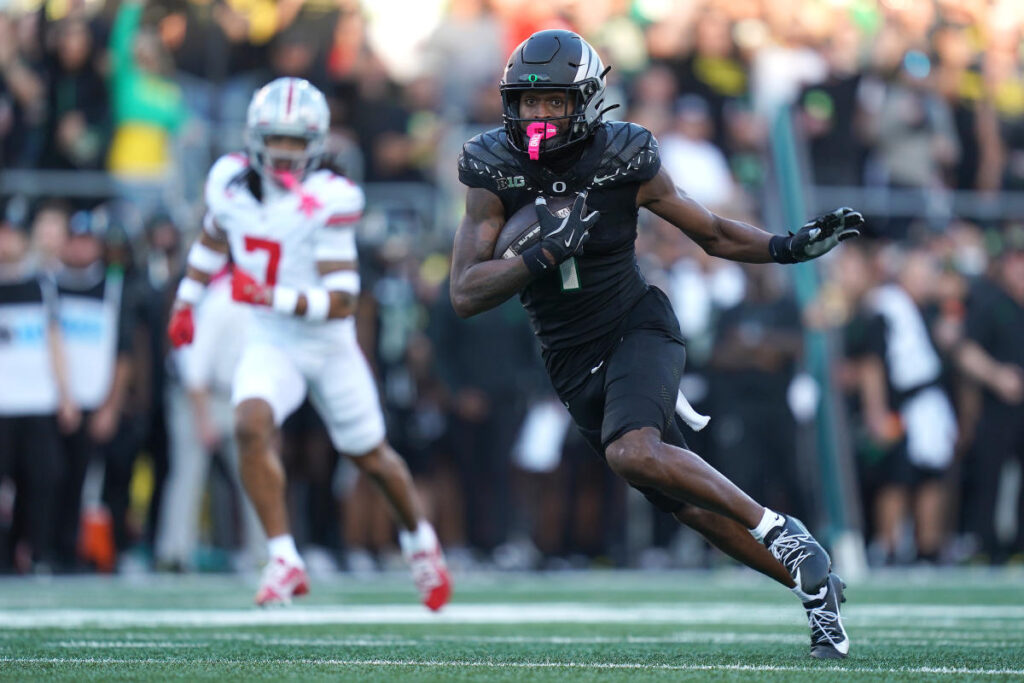In the highly anticipated matchup between the No. 3 ranked Oregon Ducks and the No. 2 ranked Ohio State Buckeyes, Oregon wide receiver Traeshon Holden made headlines for an unfortunate incident that led to his ejection from the game. During the second quarter, after a confrontation near the goal line with Ohio State’s Davison Igbinosun, Holden was observed spitting at Igbinosun in the presence of an official. This blatant act resulted in an immediate penalty and the automatic ejection of Holden, a violation of the sport’s conduct rules. The incident not only drew attention due to its unsportsmanlike nature but also due to the emotional response from Holden, who visibly struggled with the repercussions of his actions.
Following his ejection, Holden exhibited a profound sense of disappointment as he made his way up the tunnel to the locker room. His frustration was palpable; he was seen throwing his helmet in anger and later, cameras captured him on his knees, clearly upset over his lapse in judgment. This moment reflected the intense pressure athletes face in high-stakes games, where one moment of weakness can significantly impact their team’s performance and their own reputation. The incident underscored the importance of discipline and self-control in sports, particularly in high-pressure environments where emotions can easily run high.
Holden’s ejection was particularly significant given his status as one of Oregon’s standout players. Before the incident, he was instrumental in the team’s offensive strategy, ranking second among the Ducks in receptions and receiving yards. With 19 catches for 274 yards accumulated over the first five games of the season, Holden had already established himself as a key component of Oregon’s offense. The former Alabama standout had built on his previous season’s performance, in which he recorded 37 catches for 452 yards and six touchdowns. His early contributions to the Ducks this season made his sudden removal from the game feel especially detrimental to the team’s prospects.
The unfolding drama in the first half of the game coincided with an array of unusual and exciting plays. Prior to Holden’s penalty, the first half had already been a rollercoaster, characterized by a mix of controversial decisions and chaotic moments. One particularly notable moment was Oregon’s interception attempt, which was controversially ruled a catch for Ohio State despite clear evidence suggesting otherwise. Additionally, the Ducks attempted an extra point that was so poorly executed it became a comedic highlight of the game, adding to the overall unpredictability of the matchup. Another bizarre moment occurred during a kickoff, where the ball inadvertently struck an Ohio State blocker, leading to unpredictable field positioning that favored the Ducks.
The combination of Holden’s ejection and the erratic nature of the game created an atmosphere fraught with tension and uncertainty. While the Ducks had shown flashes of brilliance, such moments of ill-discipline threatened to overshadow their offensive efforts. The ejection of a key player like Holden also raised questions about the team’s depth and ability to adapt in real-time. Coaches often emphasize resilience in overcoming obstacles, and the Ducks would need to quickly regroup and strategize in light of Holden’s absence to maintain their competitive edge against a formidable Ohio State squad.
Ultimately, the ejection of Traeshon Holden serves as a poignant reminder of the fine line athletes walk between competitive spirit and sportsmanship. The emotions that fuel performances can sometimes lead to impulsive decisions, which can have lasting repercussions on a team’s morale and effectiveness. For the Ducks, navigating the rest of the game without one of their most reliable receivers posed a significant challenge. The incident also provided a vital lesson in the importance of maintaining composure under pressure—a lesson that extends beyond the field and into the broader context of competition and personal conduct. As the Ducks faced the aftermath of Holden’s penalty, they were undoubtedly aware that overcoming such hurdles would not only test their athletic skills but also their character as a team.

